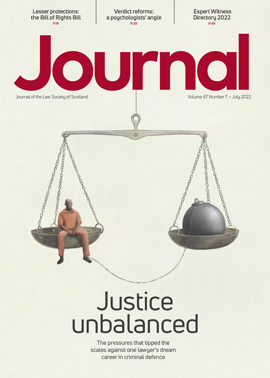Viewpoints: Gender question
Gender question
With Twitter alive over the issue, and declarations that there are up to 72 genders, the Supreme Court last December came down firmly on one side of the argument over gender identity. In R (Elan Cane) v Home Secretary [2021] UKSC 56, at para 52, the court unanimously agreed that “legislation across the statute book assumes that all individuals can be categorised as belonging to one of two sexes or genders”. Opposition to this view comes from an unlikely source.
In 1850 Parliament declared that in all statutes the masculine includes the feminine; s 1 of the Interpretation Act 1889 applied this to all legal documents, unless the contrary intention appears; and s 6 of the Interpretation Act 1978 belatedly makes it apply vice versa. Conveyancers frequently (unnecessarily) repeat this mantra in documents, but the Canal & River Trust, which controls most publicly-owned navigable waterways in England & Wales, has other ideas. Its draft documents declare that “a reference to one gender shall include a reference to the other genders (sic)”. Conveyancers in England & Wales have en masse accepted this doctrine of multiple genders, as evidenced in completed easements and other agreements with the Trust in this form. I would be interested to hear from your readers if Scottish conveyancers generally are at one with their counterparts in England & Wales, or if they instead follow the ruling of the Supreme Court.
David Pedley, retired English solicitor
The UK’s (new) Bill of Rights
While we have our regular Blog of the Month choice in this issue, we thought it worth drawing attention also to Professor Mark Elliot’s post to his publiclawforeveryone.com site, on the Bill of Rights Bill.
We cover the bill in our feature "Rights without remedies?", but Elliot’s longer read is worth a lawyer’s time also. As well as analysing what will and will not change if the bill is enacted, he takes a wider look at its overall impact, and what it tells us about the UK constitution today.
He argues that the similarities between the bill and the Human Rights Act are “largely superficial”, because the bill undermines both the European Court of Human Rights and our domestic courts – the latter through a diminishing of their powers along with controls on the way they handle Convention cases.
While the bill might make sense in political terms, he continues, the legal problem is that it rests on a false premise — “namely, that it is possible to legislate domestically in order somehow to manipulate or magic away treaty obligations that are binding upon the UK as a matter of international law... If, as is likely, [it] results in more applications to (and UK losses in) the Strasbourg Court, the Government will then face a stark choice between accepting the court’s judgments — thereby exploding the myth that the bill magically enabled the UK to loosen its international obligations via domestic legislation — or defying them and finding itself in breach of international law”.
The Government’s true objective, he concludes, is “the entrenchment of a form of executive hegemony — one that smacks of authoritarian resistance to scrutiny and is antithetical to the best traditions of the British constitution”.
Whatever one’s views, the blog is worth studying. – Editor
Perspectives
Features
Briefings
- Civil court: Issues on appeal
- Licensing: Minimum pricing – a genuine impact?
- Insolvency: How to admit joint creditor claims
- Tax: windfall and plastic packaging taxes raise stakes
- Immigration: Asylum system overhauled
- Scottish Solicitors' Discipline Tribunal: July 2022
- In-house: In with the stonework
- Property: Living with the Register of Overseas Entities
In practice
- OPG update: July 2022
- Public policy highlights: July 2022
- Gear up for the Scottish Legal Walks
- Disabled solicitor support group proposed
- Risk: Cybercrime – the hybrid worker prey
- Ask Ash: Piling it on
- TRS: time for a trusts trawl
- Know people, know business
- High street and hybrid
- Appreciation: Ian Leslie Shaw Balfour
- The Expert Witness Directory 2022
- Expert witness: case law update






